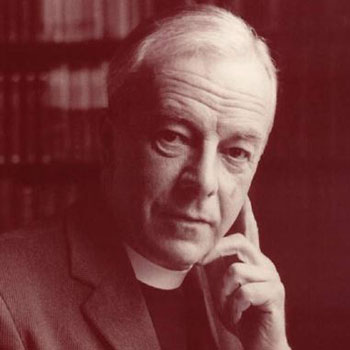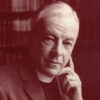Back to series



The Mysticism of Paul
Paul, by the grace of God, discovered that the glory of the mystical experience was waiting for any soul which gave itself in faith to Christ. Such union with the divine need be no transient splendour, flashing for a moment across life’s greyness and then gone; it could be the steady radiance of a light unsetting, filling the commonest ways of earth with a gladness that was new every morning.
It is necessary to grasp quite clearly what the term mysticism means, as applied to Paul’s religious experience. Efforts are periodically made to banish this conception altogether. But it is hard to destroy; it has a way of reasserting itself, and coming back into its own. Indeed, the stubborn survival-power of this term, in face of trenchant criticism and attack, suggests that it stands for something quite indispensable and essential in religion.
A hundred years ago, Schleiermacher, in The Christian Faith (p. 429), declared that an idea so vague was better avoided; and with this many today are disposed to agree. They imagine that mysticism represents something so shadowy and ill-defined and non-intellectual that to use the term is simply to “darken counsel by words without knowledge.” Others go further, and proclaim a personal aversion to the mystic and all his works. He is accused of a selfish absorption in his own individual experience. He is regarded as culpably negligent of religion’s roots in history. He is criticized for an alleged indifference to moral judgments. It is even suggested that he has not escaped the deadly sin of the superior person.
Behind all this there lies a serious confusion of thought. The type of character which seeks religious emotions and ecstasies for their own sake, which dissolves history in speculation and is defective in respect of moral duty, is unfortunately not unknown: the pity is that to religion of this kind the noble name of mysticism should ever have been applied. Linguistically, we are not so well equipped here as are the Germans: for where they have two words, Mystik and Mysticismus (the former standing for the true religious attitude, the latter for its debased and spurious imitation), we have to make the one do duty. But the confusion goes deeper than that. It is not only a case of distinguishing between what is genuine and what is forged.
We have to realize that there are important differences even within the range of what may properly be called mystical experience. A very striking illustration of this lies to our hand in one of Paul’s epistles. Writing to the Corinthians, he relates an extraordinary event which had happened in his own spiritual life. He was caught up to the third heaven. He was given the beatific vision. He had a direct experience of the presence of God. He heard divine secrets which no man was at liberty to repeat. Now the precision with which he dates this event is highly significant. It happened fourteen years before this particular letter was written. That is to say, even in the apostle’s own career, it was quite exceptional. This was not the level on which he habitually lived. The rapture and ecstasy came—and passed. The trance marked an epoch in his life. That glorious experience of the open heavens, of
“God’s presence, and His very self And essence all-divine.”
meant to Paul something akin to what Bethel meant to Jacob. Undoubtedly this was one aspect of the apostle’s mysticism. But only one. And Paul himself—this is the point to be emphasized—would have been the first to recognize and to insist that such experiences form only a comparatively small part of the soul’s deep communion with God in Christ. His whole teaching about special gifts of the Spirit, their value and their limitations, makes it perfectly clear that, while attaching great importance to these unique “visions and revelations” and glorifying God for them, he would never dream of using them to disparage the more normal experiences of souls “hid with Christ in God.” On the contrary, it was in the daily, ever-renewed communion, rather than in the transient rapture, that the inmost nature of Christianity lay. This was the true mysticism. This was essential religion. This was eternal life.
In some degree, then, every real Christian is a mystic in the Pauline sense. It is here that Paul differs very notably from his great contemporary Philo. For Philo as for Paul, a direct apprehension of the eternal was the goal of religion. But this union with God was the reward only of a privileged minority. Outside the comparatively small circle of elect, initiated souls, the
crowning experience remained unknown. And even the few who were taken into inmost fellowship with God had but broken glimpses of the glory: God was an intermittent, not an abiding, presence. This was the Philonic mysticism—noble so far as it went, but too esoteric to be a Gospel, far too restricted and aloof to be good news for a perishing world. What Paul by the grace of God discovered was that the glory of the mystical experience was waiting for any soul which gave itself in faith to Christ. Not only so: such union with the divine, he knew, need be no transient splendour, flashing for a moment across life’s greyness and then gone; it could be the steady radiance of a light upsetting, filling the commonest ways of earth with a gladness that was new every morning. Unhealthy reactions such union never could engender. The crushing sense of worldweariness which has marked too many types of mysticism, the contempt of life, the absorption in unproductive emotion, were foreign to it altogether. Its effect, as the apostle saw and as his own career in Christ convincingly proved, would be the very opposite. It would make men not less efficient for life, but more so. It would vitalize them, not only morally and spiritually, but even physically and mentally. It would give them a verve, a creativeness, an exhilaration, which no other experience in the world could impart. It would key life up to a new pitch of zest and gladness and power. This is Pauline mysticism; and great multitudes who have never used the name have known the experience, and have found it life indeed.
Mention should here be made of a fruitful distinction which Deissmann has drawn between two types of mysticism, which he calls respectively “acting” and “reacting.” “The one type”—the reacting—“is everywhere present where the mystic regards his communion with God as an experience in which the action of God upon him produces a reaction towards God. The other type of mysticism”—the acting—“is that in which the mystic regards his communion with God as his own action, from which a reaction follows on the part of Deity” (The Religion of Jesus and the Faith of Paul, p. 195). Much religion has been of the latter kind. Man’s action has been regarded as the primary thing. The soul has endeavoured to ascend towards God. Spiritual exercises have been made the ladder for the ascent. But all this savours of the religion of works as contrasted with the religion of grace. Paul’s attitude was different. His mysticism was essentially of the reacting kind. Christ, not Paul, held the initiative. Union with the eternal was not a human achievement: it was the gift of God. It came, not by any spiritual exercises, but by God’s self-revelation, God’s self-impartation. The words “It pleased God to reveal His Son in me” (Gal. 1:15), which remind us that the Damascus experience itself was the foundation of the apostle’s mysticism, are Paul’s emphatic way of saying that God’s action always holds the priority: His servant simply reacts to the action of God. Here, as everywhere in Paul, all is of grace; and it is well to be thus reminded by the apostle that union with Christ is not something we have to achieve by effort, but something we have to accept by faith.
From what has now been said, it will be apparent why we cannot agree with the proposal to drop the term “mystical” union, and speak simply of a “moral” union. There is, of course, no such thing as a union with Christ which does not have the most far-reaching effects in the moral sphere. The man who comes to be “in Christ” has found the supreme ethical dynamic. But just as religion is something more than a mere device for reinforcing conduct, so union with Christ as Paul experienced it has more in it than can be described by the one word “moral.” In this respect, it is like love. Love between human beings is morally creative. It is a master-force for character. It lets loose amazing energies for goodness. Superb ethical achievements are at its command. But no one imagines that to describe it thus is to say all that may be said. Love is moral plus, as it were: there is in it a whole range of glory and surprise which the single term cannot really convey. So with that divine union in which Paul’s religion centers: it is ethical through and through, never for a moment is it anything but ethical; and yet it is in simple justice to the facts that we press beyond the idea of a moral to that of a mystical union. Only so can we adequately depict the true inwardness and intimacy of this union, and the abiding wonder of those gifts—so lavish and undeserved and gracious and rich in beauty—which it brings with it from the side of God to man.
The analogy just used—that of the love of one person for another—lets in a flood of light on the whole matter of union with Christ. The notion which certain philosophies have almost taken for granted, that human personalities are mutually exclusive and impermeable, is disproved when the experience of love is taken into account. “Separateness” is not, in point of fact, the final truth about living souls. When we say of those to whom the gloriously enriching gift of love has come that they are “bound up” in each other, we are not indulging in empty metaphor: we are giving a strictly accurate description of what happens to their souls. Walls of partition go down, and self merges in self. Nor is the resultant union a lower state of being than the rigid separation of the self-sufficient soul: on the contrary, it is definitely higher. Now it is this potential permeation of one personality by another which makes spiritual religion possible. It is this that promotes the mystical union. But seeing that personality as it is in Christ has far greater resources, both of self-impartation and of receptiveness, than it has anywhere on the purely human level, it follows that there can exist between Christians and their Lord a degree of intimacy and unity absolutely unparalleled and unique. Hence the analogy, illuminating as it is, can never be more than an analogy; and we might indeed go the length of saying that the union of believing souls with Christ is as far beyond any merely human union as the union of the three Persons in the Godhead is beyond them both.
We must guard, however, against conveying the impression that such union implies virtual absorption of a pantheistic kind. Nothing was further from Paul’s thoughts. Here again his doctrine runs along a different line from that of Philo. “When the divine light blazes forth,” said Philo, “the human light sets; and when the former sets, the latter rises. The reason within us leaves its abode at the arrival of the divine Spirit, but when the Spirit departs the reason returns to its place.”
This suggests that what the divine immanence does is to impair or even destroy the distinctness of the human personality. But there is certainly no hint of any such idea in Paul. He never thought of Christ as overriding any man’s individuality. Union with Christ, so far from obliterating the believer’s personal qualities and characteristics, throws these into greater relief. How far any thought of absorption was from the apostle’s mind is evidenced by such statements as these: “As many as are led by the Spirit of God, they are the sons of God.” “The Spirit itself beareth witness with our spirit, that we are the children of God” (I Cor. 12:4).
The passage which, on a superficial view, comes nearest proclaiming the end of all personal identity— “I live, yet not I, but Christ liveth in me”—is followed immediately by the significant words, “the life which I now live in the flesh, I live by the faith of the Son of God,” in which, as Weiss has pointed out, Paul deliberately guards against the possible pantheistic interpretation by reasserting the religious attitude where “Thou” and “I” stand over against each other. Clearly Paul’s view is that the man whom Christ begins to possess does not thereby cease to be himself. On the contrary, like the younger son in Jesus’ story, he then for the first time really “comes to himself.” Christian experience does not depersonalize men and reduce them to a monotonous uniformity: it heightens every individual power they have. “There are diversities of gifts, but the same Spirit. And there are differences of administrations, but the same Lord. And there are diversities of operations; but it is the same God which worketh all in all” (Rom. 8:14-15). More convincing than anything Paul ever said about this is the evidence of his own life. Study the record of that amazing career, mark the impact which this Godfilled and Christ-mastered soul made upon the life of men and Churches and nations, and then declare if he was lacking in individuality! No, it was anything but a blurring and obliterating of personality that resulted from the Damascus experience. Every quality of heart and brain and soul which the man possessed was lifted into sudden, new distinctness and vigour. This was what union with Christ meant to Paul, and what he believed it could mean to all the world.
James Stuart Stewart was born in Dundee, Scotland, July 21, 1896. As a boy in his father’s YMCA Bible Class, he was influenced by the great Scottish preacher, James Denney.
Stewart earned a first class degree in classics at the University of St. Andrews. Later, following service with the Royal Engineers in World War I, he studied for the ministry at New College, Edinburgh, and then did post-graduate work at the University of Bonn.
James Stewart’s parish ministries included St. Andrews Church, Auchterarder in Perthshire; Beechgrove Church, Aberdeen; and, the ministry for which he was most known, North Morningside, Edinburgh.
In 1946, Stewart was appointed Professor of New Testament Language, Literature and Theology in the University of Edinburgh, a post which he held for two decades until his retirement in 1966. During this time, he served as a Royal Chaplain and as the Chaplain of the Heart of Midlothian Football Club. From 1963-64, he was Moderator of the General Assembly of the Church of Scotland.
During his tenure at the University of Edinburgh, Stewart delivered important lecture series at Union Theological Seminary, New York, Yale Divinity School, Princeton Theological Seminary, and the Duff Missionary Lectures in Scotland. His books include Life and Teaching of Jesus Christ (1934), A Man in Christ: the Vital Elements of Paul’s Religion (1935), Heralds of God (1946; later reprinted as Teach Yourself Preaching), and A Faith to Proclaim.
James Stewart married Rosamund Anne Barron in 1931. They had two sons, Robin and Jack. Rosamund died in 1986, James in 1990.
Award-winning media great, Bill Moyers, wrote, “I heard James Stewart preach one sermon when he visited Texas forty years ago and resolved on the spot to sit at his feet in Edinburgh. I had never heard a man whose words so touched both heart and mind....This learned, eloquent, gentle man lived the Gospel he preached and by word and example gave us truth to build on.”

James S. Stewart
ProfessorJames S. Stewart (1896 – 1990) earned a first-class degree in classics at the University of St. Andrews. He studied for the ministry at New College, Edinburgh, and then did post-graduate work at the University of Bonn. In 1946, Stewart was appointed Professor of New Testament Language, Literature and Theology in the University of Edinburgh, a post which he held for two decades until his retirement in 1966. His books include Life and Teaching of Jesus Christ (1934), A Man in Christ: the Vital Elements of Paul’s Religion (1935), Heralds of God (1946; later reprinted as Teach Yourself Preaching), and A Faith to Proclaim.

 COPYRIGHT: This publication is published by C.S. Lewis Institute; 8001 Braddock Road, Suite 301; Springfield, VA 22151. Portions of the publication may be reproduced for noncommercial, local church or ministry use without prior permission. Electronic copies of the PDF files may be duplicated and transmitted via e-mail for personal and church use. Articles may not be modified without prior written permission of the Institute. For questions, contact the Institute: 703.914.5602 or email us.
COPYRIGHT: This publication is published by C.S. Lewis Institute; 8001 Braddock Road, Suite 301; Springfield, VA 22151. Portions of the publication may be reproduced for noncommercial, local church or ministry use without prior permission. Electronic copies of the PDF files may be duplicated and transmitted via e-mail for personal and church use. Articles may not be modified without prior written permission of the Institute. For questions, contact the Institute: 703.914.5602 or email us.
-
Recent Podcasts
Fix Your Eyes Upon Jesus
by Steven Garber, Aimee Riegert on June 27, 2025Perhaps the most prominent and current figure who...Read More
-
An Honest Search for God – Dr. Jay Medenwaldt’s Story
by Jana Harmon, Jay Medenwaldt on June 20, 2025
-
Moving Beyond Forgiveness to an Abundant Life
by Robert Saucy, Aimee Riegert on June 13, 2025
-
Recent Publications
Are Miracles Possible
by Christopher L. Reese on June 1, 2025The 21st century has provoked many conversations and...Read More
-
Is God Just, Not Fair?
by Jennifer Rothschild on May 15, 2025
-
Seeking Dietrich Bonhoeffer
by Joseph A. Kohm on April 29, 2025
0
All Booked
0.00
All Booked
0.00
All Booked
24720
The Adventure of Joining God in His Work Live Online Small Group 7:00 PM CT
https://www.cslewisinstitute.org/?event=the-adventure-of-joining-god-in-his-work-live-online-small-group-700-pm-ct&event_date=2025-09-16®=1
https://www.paypal.com/cgi-bin/webscr
2025-09-16

Next coming event
Days
Hours
Minutes
Seconds
The Adventure of Joining God in His Work Live Online Small Group 7:00 PM CT
On September 16, 2025 at 7:00 pmSpeakers

James S. Stewart
Professor
Team Members

James S. Stewart
ProfessorJames S. Stewart (1896 – 1990) earned a first-class degree in classics at the University of St. Andrews. He studied for the ministry at New College, Edinburgh, and then did post-graduate work at the University of Bonn. In 1946, Stewart was appointed Professor of New Testament Language, Literature and Theology in the University of Edinburgh, a post which he held for two decades until his retirement in 1966. His books include Life and Teaching of Jesus Christ (1934), A Man in Christ: the Vital Elements of Paul’s Religion (1935), Heralds of God (1946; later reprinted as Teach Yourself Preaching), and A Faith to Proclaim.





